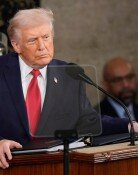Korean inflation hits high in April at 4.6%
Korean inflation hits high in April at 4.6%
Posted May. 05, 2022 07:47,
Updated May. 05, 2022 07:47
Rapidly rising consumer prices of 4.8% in April year-on-year suggests that the Korean economy is facing challenges marked by three highs of inflation, oil prices and exchange rates. Inflation in April was the highest in 13 and a half years since October 2008 during the global financial crisis. Increase rate of consumer price index, which consists of necessities such as rice, ramyun and eggs, reached 5.7%. When including housing prices as done for other advanced nations when calculating inflation, the actual inflation rate would be 1 to 2 percentage points higher.
The global inflation is the result of revived demand in consumption in which governments and central banks around the world worked together to increase liquidity in the pandemic situation against limited supply situations caused by global supply chain disruption and the war in Ukraine. Energy prices such as oil and natural gas, raw materials - nickel, cobalt and lithium - needed for electric cars and batteries production, agricultural prices such as flour and barely have skyrocketed, and experts say it will take at least two years to resume to normal situations.
The Bank of Korea will be forced to contemplate on its interest rate policy for the future as the U.S. Fed raised base rates this morning. It had already increased base rates up to 1.5%, but if the U.S. continues to raise by 0.5 percentage points, it will cause U.S. rates to be higher, suggesting foreign capital flight. About 13.76 trillion won of foreign capital has exited the Korean stock market for the first four months of the year. If we raise interest rates too quickly, it will impact the economy, raising interest bearing burdens for households and business, causing stagflation.
We are seeing rising competition for talent among IT companies and conglomerates, increased demand of higher pay in businesses with lower productivity triggering labor management conflicts, initially sparked by higher pays in food delivery markets. Coupled by rising public utility prices, small and medium businesses and the self-employed are driven to challenges that are more daunting than ever.
Such complex challenges seen from home and abroad are very difficult, even when backed by close collaboration of the government and the central bank. Even so, the outgoing government has paid a blind eye to dealing with inflation while the new government, which is still without a cabinet, is preoccupied with the local elections to be held in four weeks, suggesting pork-barreling policies that fuel higher interest rates. To prevent the economy from falling, we must remain vigilant and remind ourselves that we are out at a critical point.






![‘부화방탕 대명사’ 북한 2인자 최룡해의 퇴장 [주성하의 ‘北토크’]](https://dimg.donga.com/c/138/175/90/1/wps/NEWS/IMAGE/2026/02/27/133414028.1.jpg)
